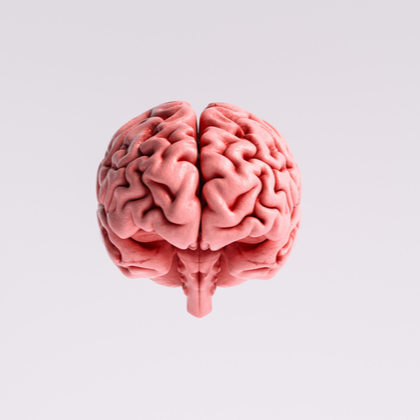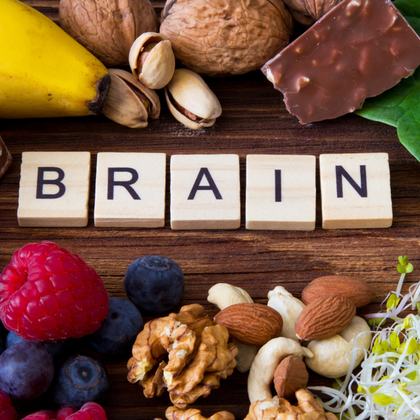
Consider some of the wonderful things your brain can do. It lets you think clearly and learn new things. It allows you to remember, use reason, make judgements, and use language to communicate. All these things and more are collectively known as cognition, with cognitive health a measure of the effectiveness of your cognitive functioning.
If you have good cognitive health you won’t have any problems with thinking, learning and remembering. But cognitive health can be affected by a number of factors including your genetic make-up, your overall health and your lifestyle. And if your cognitive health is below par you may find your thinking and memory skills aren’t as sharp as they should be.
Scientists have described cognition in a broad sense as information processing (i). Some of the aspects of cognition, they say, include the ability to learn necessary skills, solve problems, think abstractly, do mathematics and have control over primitive reactions, plus other things like comprehension, attention and perception. If your cognitive health isn’t up to scratch, some of the things you may have difficulties with may include:
-
Paying attention
-
Processing information quickly
-
Remembering and recalling information
-
Responding to information quickly
-
Thinking critically, planning, organising and solving problems
-
Speech
What can affect your cognitive health?
There are several factors that are thought to have a potential impact on your cognitive health, including the following:
-
Physical and mental health issues such as heart disease, diabetes, stroke, depression and brain injuries
-
Certain medicines (including misuse of medicines)
-
An inactive lifestyle
-
Poor diet
-
Smoking
-
Drinking too much alcohol
-
Social isolation
-
Poor sleep
-
Stress
-
Having a mental illness such as schizophrenia, bipolar disorder or depression
How do you maintain cognitive health in older age?
Cognitive skills also change with age, and as we get older we experience a relatively small decline in them known as normal cognitive ageing. According to Age UK most of us are affected by normal cognitive ageing, and it shouldn’t usually affect our independence or quality of life (ii).
For instance, as you get older your knowledge or general vocabulary aren’t normally affected. However you may experience small changes in your short-term memory, your reasoning skills and the speed at which you process information. The sort of things you may notice occasionally are forgetting names, passwords and numbers, not being able to find things and forgetting to keep appointments – all of these are normal and affect most people from time to time as they get older.
Meanwhile cognition isn’t the only function of the human brain. It also controls your motor function (that is, how well you make and control movements, including balance); your emotional function (whether or not you interpret and respond well to emotions); and your tactile function (your response to pain, pressure, temperature and other touch sensations).
How does the brain work?
The human brain is incredibly complex and each one is unique. It’s about the size of two clenched fists and weighs, on average, about 1.5kg (iii). And while it only accounts for a small percentage of your total body weight (about two per cent on average), it receives 20 per cent of your blood supply and uses 20 per cent of the energy you get from food (iv).
Your brain is made up of around 100 billion nerve cells called neurons – often collectively called grey matter – as well as a trillion supporting cells that stabilise the neural tissue (iii).
Brain structure and function
Some of the main sections of the brain include:
Cerebrum This is the largest section of the brain and is responsible for controlling movement and processing sensory information. It is also responsible for speech, hearing, intelligence, memory and for producing conscious and unconscious actions and feelings. The cerebrum is comprised of two halves – the right half (or hemisphere), which controls the left side of the body, and the left, which controls the right. Both halves are connected by a thick bunch of nerve fibres called the corpus callosum.
The cerebrum has a thin outer layer of tissue made up of neurons. This layer, which is folded to increase its surface area, is called the cerebral cortex. In most people the left cerebral cortex is responsible for speech and language, while the right is responsible for spatial thinking and imagery.
Diencephalon This is a collection of brain structures found towards the centre of the brain that regulate things such as hormone production, motor function and sensory perception in the body. These structures include the thalamus, the hypothalamus and the pineal gland:
-
The thalamus consists of two lobes of grey matter and processes sensory information as well as controlling sleep.
-
The hypothalamus is about the size of an almond and is found under the thalamus. It helps to regulate essential involuntary functions such as breathing, blood pressure, body temperature and the beating of your heart, as well as reflexes such as coughing and sneezing.
-
The pineal gland is even smaller than the hypothalamus and is found between the two thalamus lobes. Its main job is to produce the hormone melatonin, which regulates your sleep patterns.
Brain stem This is the lower part of your brain that connects to your spinal cord. It is made up of structures including the midbrain, pons and medulla oblongata, which together help to regulate several involuntary functions as well as things like taste, digestion, balance and co-ordination.
Cerebellum Also responsible for co-ordination and balance, the cerebellum is found above the back of the neck, behind the brain stem. It includes three areas that have different functions: the cerebrocerebellum, which is the largest area, is involved in planning movements and motor learning while regulating co-ordination of muscle activation; the spinocerebellum regulates body movements; and the vestibulocerebellum controls balance and helps to stabilise vision.
What conditions affect cognition?
There are many problems that can affect the brain. The US-based National Institute of Neurological Disorders and Stroke, for instance, supports research on more than 600 neurological diseases. Some of these conditions include muscular dystrophy, epilepsy, brain tumours and cerebral palsy. Here are some of the brain conditions that affect your cognition:
What conditions affect cognition?
If you have mild cognitive impairment it means you are affected by a level of cognitive decline that’s higher than normal for your age, but the symptoms aren’t bad enough to interfere significantly with your daily life. These symptoms can include problems with your memory, your reasoning or problem solving, your attention (including being very easily distracted), your language (that is, if you often struggle to find the right word) and your vision (you may find it hard to just distances, for example).
It’s difficult to know exactly how many people experience mild cognitive impairment, as many of us may not seek medical help for it. There is, however, some evidence that 10 - 20 per cent of people aged 65 and older are affected by it, with men having a higher risk than women (vi).
The good news is, according to the NHS, 40 per cent of people diagnosed with mild cognitive impairment return to a level of functioning that’s normal for their age (vii). And while having mild cognitive impairment does increase your risk of developing dementia in the future, only one in 10 people each year do progress to dementia, while only a third of people with mild cognitive impairment progress to dementia within 10 years.
There aren’t currently any medicines approved for treating mild cognitive impairment, though you may be advised to exercise regularly, to eat healthily, to reduce the amount of alcohol you drink and to stop smoking.
Dementia
Dementia is primarily thought of as a condition that causes memory loss, but several other aspects of cognitive health can be affected too, including thinking skills, language, learning, planning, mood, orientation and judgement.
According to the World Health Organisation there are 47.5 million people in the world with dementia, with 7.7 million developing the condition each year (viii). In the UK, around 850,000 people are thought to have dementia, including one in 14 people over the age of 65 (ix).
Yet while your risk of developing dementia does get higher as you get older, it is far from an inevitable part of ageing. In fact, more than half of people will never develop dementia even if they reach their 95th birthday (viii).
The most common type of dementia is Alzheimer’s disease, which affects around 60 per cent of people with dementia in the UK (the second most common type is vascular dementia, which affects around 17 per cent (ix)). Other much less common types of dementia include dementia with Lewy bodies, frontotemporal dementia, posterior cortical atrophy, primary progressive aphasia and mixed dementia (when you have more than one type), with rare forms including Huntingdon’s disease, Creutzfeldt-Jacob disease, progressive supranuclear palsy, corticobasal syndrome and chronic traumatic encephalopathy.
There is no cure for dementia at the moment. But if diagnosed early the progress of the disease can be slowed down with medication in some cases. This is why it’s important to see your GP without delay if you notice you’re having problems with things like your memory, your mental sharpness, your understanding or your movements, or even if you’re having difficulties carrying out daily activities.
A stroke
Cognitive impairment and memory loss are also common after a stroke, as stroke affects parts of the brain that are involved with things like attention, memory, language and orientation. Scientists have also found that around 30 per cent of people who have a stroke develop dementia within a year – indeed stroke is thought to be the second most common cause of cognitive impairment and dementia (x).
Often referred to as a brain attack, a stroke is caused either by reducing blood and oxygen flow to the brain or by bleeding in the brain – these are called ischemic stroke and haemorrhagic stroke respectively. A transient ischemic attack – also called TIN or a mini stroke – is sometimes considered as a third type of stroke, caused by a temporary interruption of blood flow to the brain.
Most strokes happen in older people, but younger people can be affected too, even children – according to Stroke UK, one in four strokes in this country happen in people of working age (xi). Besides age, however, there are many other things that can increase your risk of having a stroke, including:
-
Unhealthy diet
-
Family history of stroke
-
Ethnicity (your risk is higher if you are of African, Caribbean or South Asian descent)
Parkinson’s disease
If you have Parkinson’s disease, your brain becomes damaged progressively over many years. The main symptoms are physical – shaking of the hands and other parts of the body, stiff muscles and slow movement – but there are many other symptoms, including depression, anxiety and memory problems. Indeed, according to the US-based Parkinson’s Foundation, some people with Parkinson’s experience mild cognitive impairment (xii).
The Parkinson’s Foundation also claims that cognitive changes accompanying Parkinson’s during the early stages tend to be limited to one or two areas, including attention, mental processing, problem-solving, memory, language and visual difficulties (such as being able to measure distance and depth).
Some people with Parkinson’s also go on to develop dementia, with most affected by types of dementia called Parkinson’s dementia and dementia with Lewy bodies (around half of people with Parkinson’s are thought to develop dementia at some stage (xiii)).
Parkinson’s disease most often develops in people over the age of 50, affecting about five in every thousand people in their 0s and about 40 in every thousand in their 80s (xiii). We don’t yet know exactly what causes the damage in the brain that’s found in Parkinson’s, but experts believe there may be a genetic link in some people, with others believing things like pesticides, traffic or industrial pollution may be contributing factors (though there’s not any strong enough evidence to prove it) (xiv).
How to improve cognitive health
Having a healthy lifestyle is arguably the best thing you can do to maintain and even improve your cognitive health. Some of the things you could get into the habit of doing to give your brain a boost include the following:
Look after your health
Taking care of yourself and managing any existing health problems you may have may help you to maintain your cognitive health, especially as you get older. For instance, health problems such as high blood pressure, high cholesterol, diabetes and obesity are well known risk factors for cognitive conditions such as dementia, so keeping these under control may be helpful for your cognitive and your physical health. This may mean going for regular health screenings, for instance, and making sure you take any medication your doctor has prescribed for you correctly.
If you smoke, giving up is also a worthwhile goal, as is limiting the amount of alcohol you drink (aim for no more than 14 units each week on a regular basis). Getting plenty of sleep is also a good idea – see our guide to sleep and insomnia for advice if you’re not sleeping as well as you should.
Eat a nutritious diet
A healthy nutritious diet has been linked with a reduced risk of many chronic diseases – so it may keep your brain healthy too. A healthy diet ideally includes:
-
Five portions of fruit and vegetables a day.
-
Plenty of starchy carbohydrates such as pasta, rice, potatoes, bread, porridge and other cereals.
-
Some protein (lean meat, fish, pulses, beans, eggs and other alternative vegetarian or vegan proteins).
-
Some milk and dairy foods (other foods that contain calcium include soya foods, bread, broccoli and cabbage).
-
Occasional small amounts of foods that are high in fat and/or sugar as part of an otherwise healthy balanced diet.
Meanwhile a review of 12 studies concludes that people who mostly eat a Mediterranean diet may have slower cognitive decline as well as a lower risk of developing Alzheimer’s (xv). A Mediterranean diet is one that’s rich in vegetables, legumes, fruit, nuts, cereals, fish and with moderate amounts of alcohol, and low in meat, poultry and dairy foods.
For more details about how diet can affect cognitive health, read our guide
Maintain a physically active lifestyle
If you’re physically active, you’re more likely to be strong, fit and healthy, which means your physical healthy may benefit. Exercise can also be good for your mood and reduce depression (xvi), with studies also linking it with brain and cognitive benefits (xvii).
According to the NHS, to stay healthy adults should do 150 minutes of moderate-intensity activity every week (xviii). Any type of physical activity is better than none, even doing the housework or gardening. However if you have an existing medical condition or you haven’t been very active lately, always speak to a healthcare professional before taking on any new exercise regime.
Keep your mind stimulated
There’s some evidence that rates of certain cognitive problems such as dementia may be lower in people who keep their minds active throughout their lives (xix). Some of the activities suggested by the NHS include reading, learning new languages, playing musical instruments and having new activities or hobbies, but you could also try playing games such as board games or even online games like chess or play Scrabble on your phone.
Staying socially active is also thought to be important for a healthy brain, which makes having an active social life a must. This doesn’t just mean meeting up with friends and family but could also include things like taking part in group sports, taking a class at your local education centre or volunteering in your local community .
There are more tips on staying connected in our article How to deal with loneliness and feeling isolated.
Manage stress and mental wellbeing
Short-term stress is natural – you could even argue it’s a necessary part of life. But if you’re stressed out in the long term it can cause changes in your brain (xx). So it’s a good idea to try to limit stress whenever possible – read our guide to stress symptoms and signs to find out how.
Meanwhile if you’re experiencing low mood or depression, try to take steps to manage it and keep it under control without delay. Experts believe depression and the risk of dementia are linked (xxi), and while some think depression may in fact be an early symptom of dementia, others suggest depression could play a part in the development of dementia (xxii). Find out more about ways to manage depression naturally in our guide to depression signs and symptoms
Natural support and supplements for brain health
Besides the lifestyle measured outlined above, there is another option that you may want to consider to keep your brain healthy – that is, taking supplements. Many people take nutritional supplements to support their physical and mental health, but these days brain health supplements are also becoming increasingly popular.
Here’s a list of some of the most popular nutritional supplements that may be useful if you want to maintain your cognitive health or even give it a bit of a boost.
-
High-strength fish oils
-
Turmeric (curcumin)
-
Ginkgo biloba
-
B complex
-
Astaxanthin
-
Iodine
-
Rosemary
-
Iron
-
Phosphatidyl serine
-
Zinc
-
Ashwagandha
-
Vitamin C
-
Magnesium
-
Calcium
-
Green tea
If you want to read more about these supplements and the scientific evidence that supports their use for cognition support, read our guide to Diet and cognitive health.
For information about a wide range of physical, mental and cognitive health and wellbeing issues, take a tour around our health library.
References:
-
Trivedi JK. et al., Cognitive deficits in psychiatric disorders: Current status. Indian J Psychiatry. 2006 Jan;48(1):10-20. Available online: https://www.ncbi.nlm.nih.gov/pmc/articles/PMC2913637/
-
Available online: https://www.ageuk.org.uk/information-advice/health-wellbeing/mind-body/staying-sharp/thinking-skills-change-with-age/
-
Available online: https://www.ncbi.nlm.nih.gov/books/NBK279302/#:~:text=The%20brain%20works%20like%20a,the%20root%20of%20human%20intelligence.
-
Available online: https://www.ageuk.org.uk/information-advice/health-wellbeing/mind-body/staying-sharp/your-brain/
-
Available online: https://www.ninds.nih.gov/Disorders/Patient-Caregiver-Education/Know-Your-Brain
-
Available online: https://patient.info/doctor/mild-cognitive-impairment
-
Available online: https://www.nhft.nhs.uk/download.cfm?doc=docm93jijm4n9628
-
Available online: https://patient.info/brain-nerves/memory-loss-and-dementia
-
Available online: https://www.dementiauk.org/understanding-dementia/types-and-symptoms/
-
Available online: https://www.ncbi.nlm.nih.gov/pmc/articles/PMC4164290/
-
Available online: https://www.stroke.org.uk/what-is-stroke/are-you-at-risk-of-stroke
-
Available online: https://www.parkinson.org/Understanding-Parkinsons/Symptoms/Non-Movement-Symptoms/Cognitive-Changes
-
Available online: https://patient.info/brain-nerves/parkinsons-disease-leaflet
-
Available online: https://www.nhs.uk/conditions/parkinsons-disease/causes/https://www.nhs.uk/conditions/parkinsons-disease/causes/
-
Lourida I. et al., Mediterranean diet, cognitive function, and dementia: a systematic review. Epidemiology. 2013 Jul;24(4):479-89. Available online: https://journals.lww.com/epidem/Fulltext/2013/07000/Mediterranean_Diet,_Cognitive_Function,_and.1.aspx
-
Available online: https://www.nhs.uk/conditions/stress-anxiety-depression/exercise-for-depression/
-
Available online: https://www.nia.nih.gov/news/moderate-physical-activity-linked-increases-metabolism-across-brain-regions
Available online: https://www.nia.nih.gov/news/physical-activity-and-motor-ability-associated-better-cognition-older-adults-even-dementia -
Available online: https://www.nhs.uk/conditions/stress-anxiety-depression/exercise-for-depression/
-
Available online: https://www.nhs.uk/conditions/alzheimers-disease/prevention/
-
McEwen BS. et al., Neurobiological and Systemic Effects of Chronic Stress. Chronic Stress (Thousand Oaks). 2017 Jan-Dec;1: 2470547017692328. Available online: https://www.ncbi.nlm.nih.gov/pmc/articles/PMC5573220/
-
Prince M. et al., World Alzheimer Report 2014 Dementia and Risk Reduction: an analysis of protective and modifiable factors. Alzheimer’s Disease International, London.. Available online: https://www.alzint.org/u/WorldAlzheimerReport2014.pdf
-
Ray. S., Davidson S., Dementia and Cognitive Decline. Age UK Research 2014.. Available online: https://www.ageuk.org.uk/globalassets/age-uk/documents/reports-and-publications/reports-and-briefings/health--wellbeing/rb_oct14_cognitive_decline_and_dementia_evidence_review_age_uk.pdf
Related Posts
Disclaimer: The information presented by Nature's Best is for informational purposes only. It is based on scientific studies (human, animal, or in vitro), clinical experience, or traditional usage as cited in each article. The results reported may not necessarily occur in all individuals. Self-treatment is not recommended for life-threatening conditions that require medical treatment under a doctor's care. For many of the conditions discussed, treatment with prescription or over the counter medication is also available. Consult your doctor, practitioner, and/or pharmacist for any health problem and before using any supplements or before making any changes in prescribed medications.

Keri
Keri Filtness has worked in the Nutrition Industry for 19 years. She is regularly called upon for her professional comments on health and nutrition related news. Her opinions have been featured by BBC3, Prima, Vitality, The Mirror, Woman’s Own and Cycling Weekly, amongst others. She has also worked one to one with journalists, analysing their diets and health concerns and recommending changes and additions, where appropriate.
View More



